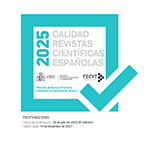The relationship between social networks and public trust in an emergency: analysis of Spanish society
Abstract
The concept of trust is widely studied by academics, identifying not only various angles from which to observe this phenomenon, but also its multiple consequences. Thus, it has been determined that improving trust in institutions is essential to increase social capital (Luoma-aho, 2005), citizen commitment (Piqueiras, 2019) or the level of legitimacy of governments (Robles and Canel, 2017). This research explores the level of trust that citizens place in government institutions and emergency institutions in a context of crisis (Covid-19), based on data from a survey carried out in Spain. The results, segmented by gender, conclude that it is women who have the least confidence in the information derived from these organizations. In addition, they are the ones that consume the most social networks during a crisis, at the same time that they consult the contents of institutional websites more, especially at the state and regional level.
Downloads
Article download
License
In order to support the global exchange of knowledge, the journal Estudios sobre el Mensaje Periodístico is allowing unrestricted access to its content as from its publication in this electronic edition, and as such it is an open-access journal. The originals published in this journal are the property of the Complutense University of Madrid and any reproduction thereof in full or in part must cite the source. All content is distributed under a Creative Commons Attribution 4.0 use and distribution licence (CC BY 4.0). This circumstance must be expressly stated in these terms where necessary. You can view the summary and the complete legal text of the licence.










